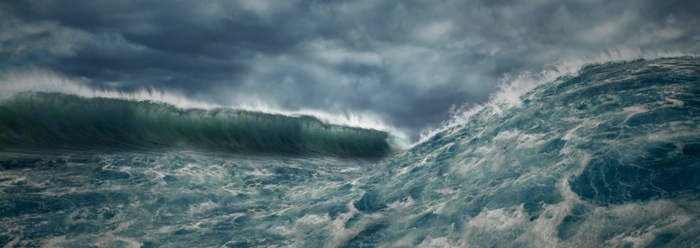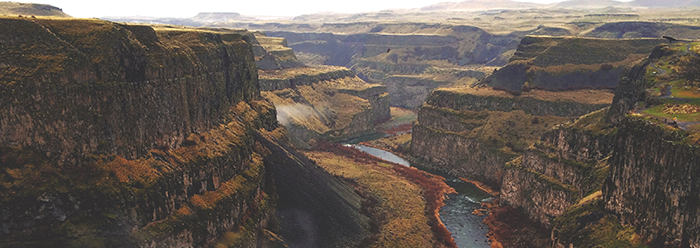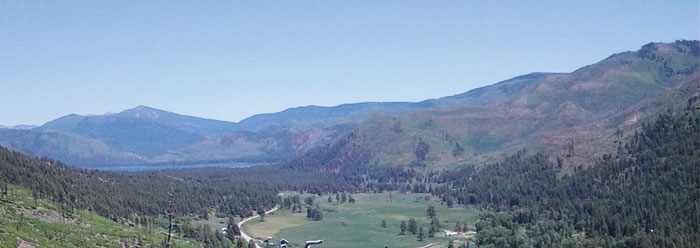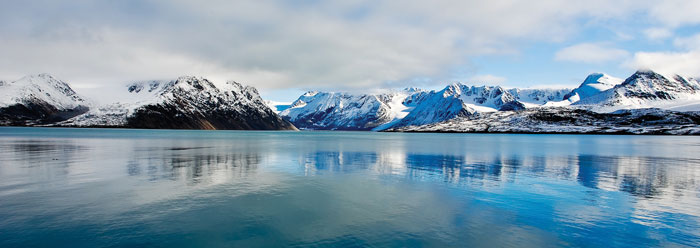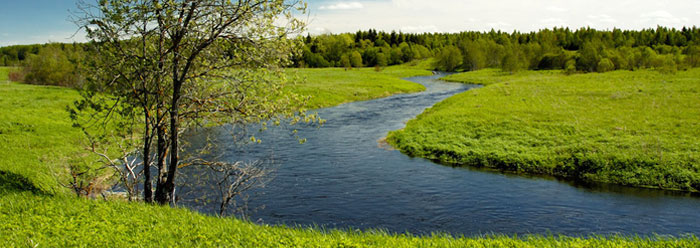The ones on the ark were young, small, and didn't take up much room or eat a lot.
Noah's Ark and Flood
Catastrophic Superfaults and the Biblical Flood
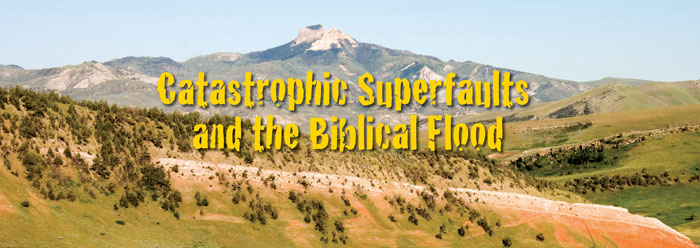
The more we study about the great Flood of Noah's Day, the more we realize it was a time of vast tectonic change on earth. Scripture provides the basic framework for all knowledge, but doesn't necessarily give every detail, leaving it up to the Christian to "think God's thoughts after Him." Processes during the great Flood acted on an unimaginable scale, accomplishing extensive geologic work. More...
Creation Model and Sea Floor Studies Agree: Past Volcanism Heated Ancient Oceans
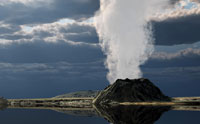 Earth's surface shows features that clearly testify to some kind of catastrophic event, or series of events, that operated on a vastly larger scale than today's geologic processes. Whatever happened had a devastating impact on living creatures large and small, terrestrial and marine.
Earth's surface shows features that clearly testify to some kind of catastrophic event, or series of events, that operated on a vastly larger scale than today's geologic processes. Whatever happened had a devastating impact on living creatures large and small, terrestrial and marine.
But the event's cause, effect, timing, and extent remain uncertain for researchers who rely only on what the bare rocks have to tell. More...
Dam Detonation Illustrates Noah's Flood
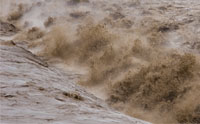 On October 26, strategically placed explosives breached the Condit Dam in Washington state. Upon detonation, instead of clear water, fast-moving mud emerged from the torrent below the damaged dam. A time-lapse video showed loads of silt sinking, settling, and flowing away with the dark fluid.
On October 26, strategically placed explosives breached the Condit Dam in Washington state. Upon detonation, instead of clear water, fast-moving mud emerged from the torrent below the damaged dam. A time-lapse video showed loads of silt sinking, settling, and flowing away with the dark fluid.
Given the small-scale nature of this event, what effects might a much larger torrent have? More...
Genesis Flood Insights More Relevant Today than Ever
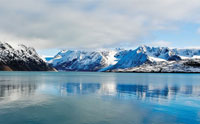 Scientific observations made in the seminal book The Genesis Flood are even more scientifically valid today than when they were first written. Although subsequent research has shown a few to be inaccurate, most of the perspectives that were laid out in the 1961 publication have been verified beyond reasonable doubt by ongoing observations.
Scientific observations made in the seminal book The Genesis Flood are even more scientifically valid today than when they were first written. Although subsequent research has shown a few to be inaccurate, most of the perspectives that were laid out in the 1961 publication have been verified beyond reasonable doubt by ongoing observations.
This is amazing, considering how geologic interpretation has changed since the 1950s. More...
Global Flood, Global Impact: The Legacy of The Genesis Flood

There has, indeed, been a remarkable revival of strict creationism (as distinct from theistic evolutionism or progressive creationism) in past decades. The Scopes Trial in 1925, however, had resulted in such an overwhelming media victory for the evolutionists that Christians as a whole seemed to want to ignore the entire controversial subject of origins, especially shying away from any attempt to influence public education. More...
Hot Mantle Initiated Ocean and Flood Beginnings

A new discovery may shed light on how the great Flood began. In a paper published in Nature Geoscience, German scientists found evidence suggesting the earth’s mantle was up to 300 degrees Fahrenheit hotter during the initial, formative stages of the Atlantic Ocean—when the continents began to violently pull apart to create it—compared to today.1 Over time, the mantle cooled to current levels. More...
Oceans of Water Deep Beneath the Earth?
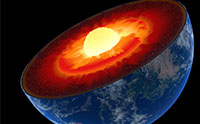 We should not imagine subterranean oceans as depicted in Jules Verne’s classic novel Journey to the Center of the Earth, but scientists keep finding evidence for vast amounts of water far below the surface in the form of hydrated minerals. The newfound waters are causing quite a stir. More...
We should not imagine subterranean oceans as depicted in Jules Verne’s classic novel Journey to the Center of the Earth, but scientists keep finding evidence for vast amounts of water far below the surface in the form of hydrated minerals. The newfound waters are causing quite a stir. More...
Cooling of the Ocean After the Flood
If ". . . all the high hills, that were under the whole heaven, were covered" by the Flood and ". . . all flesh died that moved upon the earth . . ." as described in Genesis 7:19,21, then it is likely that massive global upheavals of the crust and oceans were involved. If the geologic column is a record of catastrophic events of the Flood over a period of about a year some 5,000 years ago, then large quantities of heat would have been released from eruptions of magma in volcanoes and the mid-ocean ridges, from frictional forces of erosion, and from crustal motions such as continental breakup, plate subduction, and earthquakes. Because the oceans would have been in direct contact with many of the sources of heat, the water would have been warmed and remained so for some time following the Flood. [1] More...
Resources › Earth Sciences Resources» Next
Related Articles
Not too long ago, a scientist who claims to believe the Bible and calls himself a creationist, came to ICR to confront us with our error of teaching a recent creation. He held to a 5-billion year-old earth, a view, which we feel, is fraught with many logical fallacies, not the least of which is the insistence that the Flood of Noah was merely a local flood.
Here is the issue: All advocates of the old earth insist that "proof" of such ages lies in the rocks and fossils of the earth's crust. They claim these were laid down by either slow and gradual processes, or by occasional rapid processes of local extent. The fact that many of these rock layers are of continental extent forces them to postulate migrating shorelines, widely meandering rivers, unthinkably large deltas, etc. Furthermore, the rock units in most cases were laid down by catastrophic events, but these events, they say, were rare, occurring every million years or so.
But if the flood actually happened the way the Bible seems to describe it (i.e., a year-long, mountain-covering, world-restructuring event), it would have laid down many layers of mud full of dead things (i.e., now rocks and fossils) covering immense areas, having been deposited under catastrophic conditions. A proper interpretation of the rocks and fossils speaks of a global, dynamic, watery catastrophe: the Biblical Deluge.
Only denial of Biblical teaching could lead one to misinterpret the rocks and fossils to support long ages. If the flood happened the way the Bible says it happened, then it laid down the rocks and fossils, and there is no remaining evidence for an old earth, or evolution, for that matter.
Let me urge you to read carefully Genesis 6-9. If God was really trying to describe a local flood, He certainly could have written much more clearly, for over and over again the wording demands a global flood. In fact, I have counted over 100 times when the wording implies a global flood. Consider these few quotes of the many: "the face of the earth (i.e., planet)" (6:1); "end of all flesh . . .the earth is filled with violence . . .I will destroy them with the earth" (6:13); "destroy all flesh wherein is the breath of life, from under heaven, and everything that is in the earth shall die" (6:17); etc., etc.
Furthermore, God promised never to send another flood like Noah's Flood (9:11, 15), but there have been many local floods, even regional floods, since Noah's Flood. If Noah's Flood was only a local flood, then God lied to us. Likewise, there was no need for Noah to build an ark for his survival for he had many years' warning (6:3).
Perhaps more convincing is the fact that Jesus Christ based His teaching of coming judgment on all mankind on the fact that Noah's Flood judged all mankind (Matthew 24:36-39, Luke 17:26, 27). A local flood implies a partial judgment. Likewise, Peter based his prophecy that the existing planet: will "melt with fervent heat" (II Peter 3:10) and an entire"new heavens" and a "new earth" will be recreated (3:13) on the historical fact of the global flood of Noah's day (3:6). All things considered, few doctrines are taught as clearly in Scripture as that of the global flood.
The Christian need not distort the clear teachings of the Word of God. My testimony as a geologist is this: I know no fact of geology that cannot be interpreted by the Biblical worldview in a way at least as satisfying as (usually better than) the evolutionary, slow-and-gradual worldview.
*Dr. John Morris is President of ICR.
[body_edit] =>Not too long ago, a scientist who claims to believe the Bible and calls himself a creationist, came to ICR to confront us with our error of teaching a recent creation. He held to a 5-billion year-old earth, a view, which we feel, is fraught with many logical fallacies, not the least of which is the insistence that the Flood of Noah was merely a local flood.
Here is the issue: All advocates of the old earth insist that "proof" of such ages lies in the rocks and fossils of the earth's crust. They claim these were laid down by either slow and gradual processes, or by occasional rapid processes of local extent. The fact that many of these rock layers are of continental extent forces them to postulate migrating shorelines, widely meandering rivers, unthinkably large deltas, etc. Furthermore, the rock units in most cases were laid down by catastrophic events, but these events, they say, were rare, occurring every million years or so.
But if the flood actually happened the way the Bible seems to describe it (i.e., a year-long, mountain-covering, world-restructuring event), it would have laid down many layers of mud full of dead things (i.e., now rocks and fossils) covering immense areas, having been deposited under catastrophic conditions. A proper interpretation of the rocks and fossils speaks of a global, dynamic, watery catastrophe: the Biblical Deluge.
Only denial of Biblical teaching could lead one to misinterpret the rocks and fossils to support long ages. If the flood happened the way the Bible says it happened, then it laid down the rocks and fossils, and there is no remaining evidence for an old earth, or evolution, for that matter.
Let me urge you to read carefully Genesis 6-9. If God was really trying to describe a local flood, He certainly could have written much more clearly, for over and over again the wording demands a global flood. In fact, I have counted over 100 times when the wording implies a global flood. Consider these few quotes of the many: "the face of the earth (i.e., planet)" (6:1); "end of all flesh . . .the earth is filled with violence . . .I will destroy them with the earth" (6:13); "destroy all flesh wherein is the breath of life, from under heaven, and everything that is in the earth shall die" (6:17); etc., etc.
Furthermore, God promised never to send another flood like Noah's Flood (9:11, 15), but there have been many local floods, even regional floods, since Noah's Flood. If Noah's Flood was only a local flood, then God lied to us. Likewise, there was no need for Noah to build an ark for his survival for he had many years' warning (6:3).
Perhaps more convincing is the fact that Jesus Christ based His teaching of coming judgment on all mankind on the fact that Noah's Flood judged all mankind (Matthew 24:36-39, Luke 17:26, 27). A local flood implies a partial judgment. Likewise, Peter based his prophecy that the existing planet: will "melt with fervent heat" (II Peter 3:10) and an entire"new heavens" and a "new earth" will be recreated (3:13) on the historical fact of the global flood of Noah's day (3:6). All things considered, few doctrines are taught as clearly in Scripture as that of the global flood.
The Christian need not distort the clear teachings of the Word of God. My testimony as a geologist is this: I know no fact of geology that cannot be interpreted by the Biblical worldview in a way at least as satisfying as (usually better than) the evolutionary, slow-and-gradual worldview.
*Dr. John Morris is President of ICR.
[typeID] => 3 [visible] => t [pdf] => [publishURL] => did-noahs-flood-cover-whole-earth [publishDate] => 0000-00-00 [authorAsterisk] => f [domainID] => 1 [publication] => [volume] => [issue] => [page] => [author] => John D. Morris, Ph.D. ) -->
